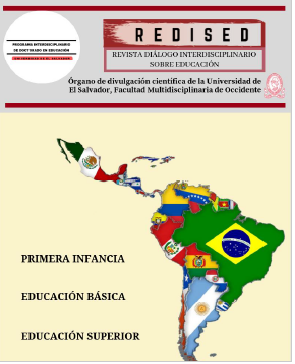Perspectiva y Aplicación Docente de la Evaluación Basada en Competencias en Educación Superior
Keywords:
Life skills, student assessment, assessment technique, engineering, higher educationAbstract
Competency Based Education is a formative process that implies holistic development of human capacities. In consonance with this approach, teaching and evaluation processes must be in accordance with the development of life skills. The objective of this study was to determine the congruence between evaluation techniques and competency approach in the course of Environmental Management which is taught at the Faculty of Engineering of Universidad Don Bosco. From a qualitative perspective, data collection techniques consisted on an interview to seven professors who taught that course in 2018 and 2019, a documentary review of the teaching planning, the applying of a checklist and a guide to determine concordance between the techniques and principles of competency assessment. The analysis was carried out by triangulation of the information in the dimensions of conception and intention of the evaluation and the techniques used. Research findings show that teachers conceive evaluation as a way to measure student achievement and feedback as a process focused on low-achieving students; besides, the consistency of the evaluation techniques used by professors under the competence approach is low. The foregoing findings allow to conclude that it is very important to deepen in the suitability of the selected evaluation techniques and its connection to the principles of the competence approach.
Downloads
References
Álvarez, I. (2008). Evaluación de aprendizajes: Una mirada retrospectiva y prospectiva desde la divulgación científica. Revista Electrónica de Investigación Psicoeducativa, 14(1), 235-272.
https://www.redalyc.org/pdf/2931/293121940013.pdf
Álvarez-Gayou, J. (2003). Cómo hacer investigación cualitativa. Metodología y fundamentos. Editorial Paidós.
Arbós, A. (2005). Evaluación de competencias. Revista Panamericana de Pedagogía, (6), 27-48. https://revistas.up.edu.mx/RPP/article/view/1854
Ayuso, J., Rivera, M., & Izquierdo, A. (2013). La evaluación por competencias en Educación Física: Modelos e instrumentos de evaluación utilizados por el profesorado. Ágora para la Educación Física y el Deporte, 15(3), 180-196. https://dialnet.unirioja.es/servlet/articulo?codigo=4530176
Barra, A., & Mora, M. (2013). Análisis de las metodologías de evaluación de los programas de formación basados en competencias. Revista Electrónica "Actualidades Investigativas en Educación", 13(3), 1-17. https://www.redalyc.org/pdf/447/44729878006.pdf
Benavides, M., & Gómez-Restrepo, C. (2005). Métodos de investigación cualitativa: Triangulación. Revista Colombiana de Psiquiatría, 34(1), 118-124. https://www.redalyc.org/articulo.oa?id=80628403009
Cano, M. (2008). La evaluación por competencias en la educación superior. Profesorado. Revista de Currículum y Formación de Profesorado, 13(3), 1-16. https://www.redalyc.org/pdf/567/56712875011.pdf
Díaz-Bravo, L. T.-G.-H. (2013). La entrevista, recurso flexible y dinámico. Metodología de Investigación en Educación Médica, 2(7), 162-167. http://www.scielo.org.mx/scielo.php?script=sci_arttext&pid=S2007-50572013000300009
Fernández, A. (2014). Evaluando la evaluación de los aprendizajes. UFG Editores. http://www.ufg.edu.sv/icti/doc/EVALUANDO-LA-EVALUACION-DE-LOS-APRENDIZAJES.pdf
Fernández, S. (2017). Evaluación y aprendizaje. MarcoELE. Revista de Didáctica Español Lengua Extranjera, (24), 1-22. https://www.redalyc.org/articulo.oa?id=92153187003
Fernández-March, A. (2010). La evaluación orientada al aprendizaje en un modelo de formación por competencias en la educación universitaria. Revista de Docencia Universitaria, 8(1), 11-34.
https://dialnet.unirioja.es/servlet/articulo?codigo=3996629
García, M., & Morillas, L. (2011). La planificación de la evaluación por competencias. REIFOP, 14(1), 113-124.
https://www.redalyc.org/articulo.oa?id=217030664007
Hernández-Sampieri, R. F. (2014). Metodología de la investigación. McGraw Hill Interamericana Editores, S.A. de C.V.
https://www.uca.ac.cr/wp-content/uploads/2017/10/Investigacion.pdf
Ion, G., & Cano, E. (2012). La formación del profesorado universitario para la implementación de la evaluación por competencias. Educación XXI, 15(2), 249-270. https://www.redalyc.org/pdf/706/70624504012.pdf
Moreno, T. (2012). Evaluación de las competencias docentes en la educación. Sinéctica, 39, 1-20.
https://www.researchgate.net/publication/262745051_La_evaluacion_de_competencias_en_educacion
Ramos, C. (2014). Los paradigmas de la investigación científica. Unife, 23(1), 9-17. https://www.researchgate.net/publication/282731622_LOS_PARADIGMAS_DE_LA_INVESTIGACION_CIENTIFICA_Scientific_research_paradigms
Ricoy, C. (2006). Contribución sobre los paradigmas de investigación. Educação. Revista do Centro de Educação, 31(1), 11-22. http://www.redalyc.org/articulo.oa?id=117117257002
Ríos, D., & Herrera, D. (2017). Los desafíos de la evaluación por competencias en el ámbito educativo. Educação e Pesquisa, 43(4), 1073-1086. doi:https://doi.org/10.1590/s1678-4634201706164230
Rivilla, A., Garrido, M., & Romero, C. (2013). Evaluación de las competencias de los estudiantes: Modelos y técnicas para la valoración. Revista de investigación educativa, 31(1), 239-255. https://revistas.um.es/rie/article/download/157601/151831/0
Sancho, C. (2020). La evaluación por competencias un análisis de su implementación en la Universidad Señor de Sipán, Perú. Controversias y Concurrencias Latinoamericanas, 12(21), 389-406. http://ojs.sociologia-alas.org/index.php/CyC/article/view/221
Tébar, L. (2010). La evaluación de aprendizajes y competencias en el aula. Fides et Ratio - Revista de Difusión cultural y científica de la Universidad La Salle en Bolivia, 4(4), 86-98. http://www.scielo.org.bo/scielo.php?script=sci_arttext&pid=S2071-081X2010000100009
UNESCO. (15 de mayo de 2021). Oficina internacional de educación. http://www.ibe.unesco.org/es/temas/enfoque-por-competencias
Villa, A., & Poblete, M. (2011). Evaluación de competencias genéricas: Principios, oportunidades y limitaciones. Bordón. Revista de Pedagogía, 63(1), 147-170. https://dialnet.unirioja.es/servlet/articulo?codigo=3601062
Downloads
Published
Issue
Section
License

This work is licensed under a Creative Commons Attribution-NonCommercial-ShareAlike 4.0 International License.


